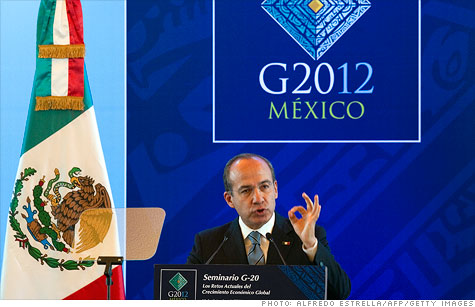
Mexican President Felipe Calderon delivers a speech in December on the challenges facing the global economy.
NEW YORK (CNNMoney) -- European leaders have taken "substantial" steps to contain the eurozone debt crisis, but they need to build a stronger financial firewall to ensure the safety of the global economy, top finance officials said Sunday.
Finance ministers and central bankers from the Group of 20 economic powers said global risks have eased following actions by European authorities to stabilize shaky government finances and restore market confidence.
In particular, the G20 ministers pointed to measures aimed at putting Greece on a "sustainable path" and actions taken by the European Central Bank, according to the group's official communiqué.
Euro area officials tentatively approved a second €130 billion bailout for Greece last week, and the ECB is set to offer a second round of low-cost, long-term loans for European banks on Wednesday.
But the G20 delayed a decision on the funding resources of the International Monetary Fund until after euro area leaders agree on the ultimate size of their financial firewall.
U.S. Treasury Secretary Tim Geithner said a "durable solution" to the crisis in Europe requires both sustained economic reforms "and a substantial financial firewall to support those reforms."
"European policy makers recognize the magnitude of the challenges ahead and will be reviewing additional steps in the weeks ahead," Geithner said in a statement.
European Union leaders, who will hold a summit in Brussels later this week, are under pressure to increase the size of the €500 billion European Stability Mechanism.
The IMF has urged EU officials to boost the ESM to €1 trillion by pooling its resources with an existing bailout fund called the European Financial Stability Facility.
The goal of the firewall is to prevent the spread of a debt contagion to larger euro area economies such as Italy and Spain, which are undertaking difficult economic reforms. However, some of the eurozone's largest economies, including Germany, remain opposed to backing additional bailout money.
While the "derailment of the global recovery" is now less of a risk than it was a few months ago, "the world economy is still not out of the danger zone," said IMF director Christine Lagarde.
Lagarde noted that the IMF has recently announced plans to raise up to $500 billion to meet estimated funding needs of $1 trillion over the coming years. She said the money "would be combined with an equally credible, high quality and properly sized firewall at the European level."
Euro area leaders have already pledged €150 billion in additional IMF funding, and Japan has also signaled that it could contribute more.
The U.S. government, the largest contributor to the IMF, has said repeatedly that the multinational organization is sufficiently funded. The Americans argue that the IMF cannot substitute for a strong firewall in Europe.
Lagarde said she was "encouraged" following the G20 meeting, but added that "concrete decisions will await the reassessment by euro area countries of their support facilities, planned for March."
Iran's oil: Meanwhile, the G20 ministers also discussed the threat posed by rising oil prices to the global economy amid rising tensions between Iran and the West, according to Geithner.
In a statement, Geithner said he had a series of conversations with G20 members planning to "significantly reduce imports from Iran." He added that international pressure on the Central Bank of Iran has made it "harder than ever" for Iranian banks to "facilitate Iran's illicit nuclear activities or to help Iran evade sanctions."
The U.S. government and other G20 nations "are working together to help ensure there are alternative sources of oil from major producers to help offset reductions in exports from Iran," he added.
China's currency: Geithner also welcomed the steps that China has taken to increase domestic consumption and allow its currency to appreciate in the foreign exchange market.
He said the renminbi has appreciated by about 12% against the U.S. dollar since June 2010 after taking into account China's higher level of inflation.
"That's welcome progress, and we believe it is in China's interest and in the interest of the global economy for their exchange rate to continue to appreciate," said Geithner.
The G20 consists of large, industrialized economies such as the United States, Germany, France, Italy, Japan, the United Kingdom and Canada. The group also includes emerging economic powers China, India, Brazil and Russia.
This weekend's meeting was the first under the Mexican Presidency, which is the first Latin American country to host the G20. It comes ahead of a meeting of G20 heads of state, including President Obama, in June. ![]()
| Index | Last | Change | % Change |
|---|---|---|---|
| Dow | 32,627.97 | -234.33 | -0.71% |
| Nasdaq | 13,215.24 | 99.07 | 0.76% |
| S&P 500 | 3,913.10 | -2.36 | -0.06% |
| Treasuries | 1.73 | 0.00 | 0.12% |
| Company | Price | Change | % Change |
|---|---|---|---|
| Ford Motor Co | 8.29 | 0.05 | 0.61% |
| Advanced Micro Devic... | 54.59 | 0.70 | 1.30% |
| Cisco Systems Inc | 47.49 | -2.44 | -4.89% |
| General Electric Co | 13.00 | -0.16 | -1.22% |
| Kraft Heinz Co | 27.84 | -2.20 | -7.32% |
| Overnight Avg Rate | Latest | Change | Last Week |
|---|---|---|---|
| 30 yr fixed | 3.80% | 3.88% | |
| 15 yr fixed | 3.20% | 3.23% | |
| 5/1 ARM | 3.84% | 3.88% | |
| 30 yr refi | 3.82% | 3.93% | |
| 15 yr refi | 3.20% | 3.23% |
Today's featured rates: